Schmitt C.B. (ed.) The Cambridge History of Renaissance Philosophy
Подождите немного. Документ загружается.

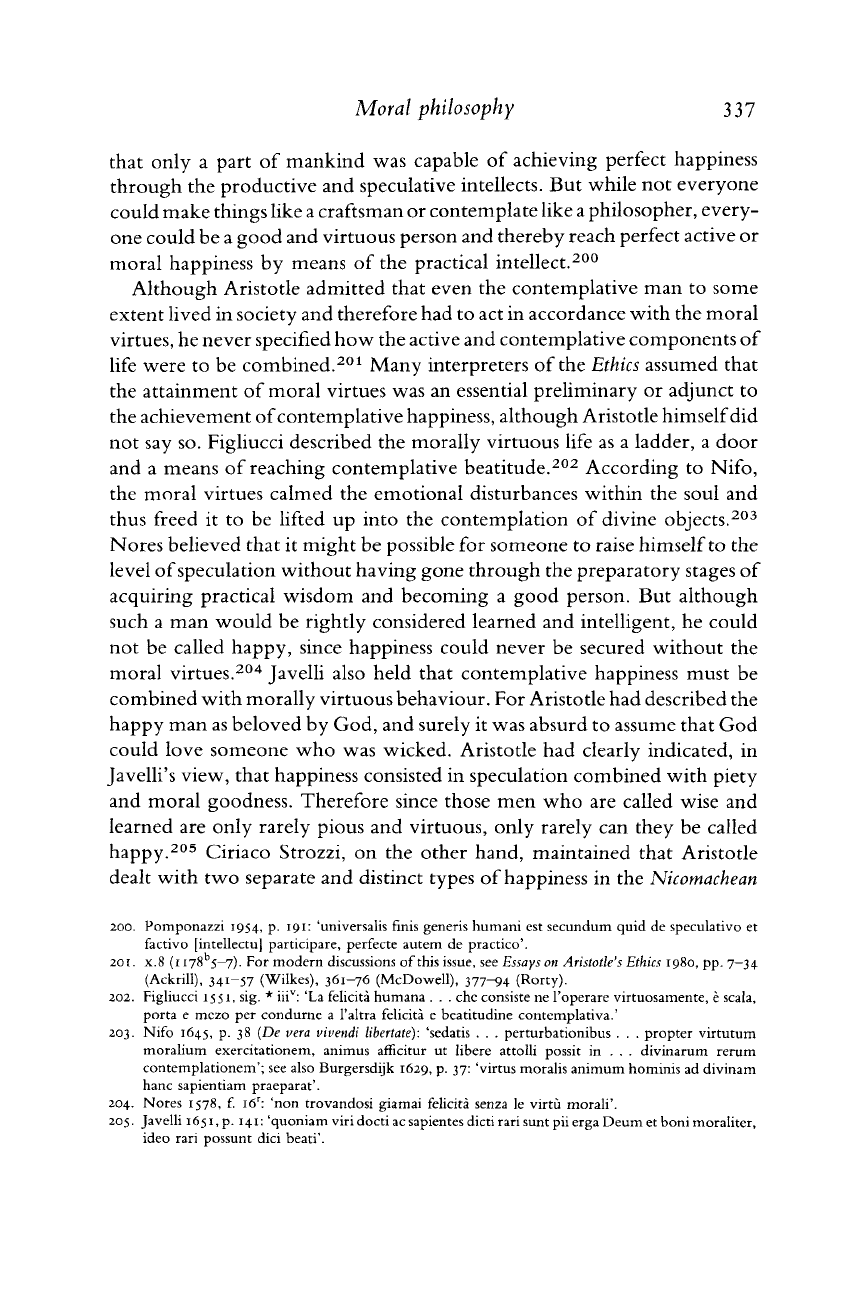
Moral philosophy
337
that
only
a
part
of
mankind
was
capable
of
achieving perfect happiness
through
the
productive
and
speculative intellects.
But
while
not
everyone
could
make things like
a
craftsman
or
contemplate like
a
philosopher, every-
one could
be a
good
and
virtuous person
and
thereby reach perfect active
or
moral happiness
by
means
of the
practical intellect.
200
Although
Aristotle admitted
that
even
the
contemplative
man to
some
extent
lived
in
society
and
therefore
had to act in
accordance with
the
moral
virtues,
he
never specified
how the
active
and
contemplative components
of
life
were
to be
combined.
201
Many
interpreters
of the
Ethics assumed
that
the
attainment
of
moral virtues
was an
essential preliminary
or
adjunct
to
the achievement
of
contemplative happiness, although Aristotle
himself
did
not
say so.
Figliucci
described
the
morally virtuous
life
as a
ladder,
a
door
and
a
means
of
reaching contemplative beatitude.
202
According
to
Nifo,
the moral virtues calmed
the
emotional disturbances within
the
soul
and
thus
freed
it to be
lifted
up
into
the
contemplation
of
divine objects.
203
Nores believed
that it
might
be
possible
for
someone
to
raise
himself
to
the
level
of
speculation without having gone through
the
preparatory stages
of
acquiring practical wisdom
and
becoming
a
good person.
But
although
such
a man
would
be
rightly considered learned
and
intelligent,
he
could
not
be
called happy, since happiness could never
be
secured without
the
moral virtues.
204
Javelli also held
that
contemplative happiness must
be
combined with morally virtuous behaviour.
For
Aristotle
had
described
the
happy
man as
beloved
by
God,
and
surely
it
was absurd
to
assume
that
God
could
love
someone
who was
wicked. Aristotle
had
clearly indicated,
in
Javelli's
view,
that
happiness consisted
in
speculation combined with piety
and moral goodness. Therefore since those
men who are
called wise
and
learned
are
only rarely pious
and
virtuous, only rarely
can
they
be
called
happy.
205
Ciriaco Strozzi,
on the
other
hand,
maintained
that
Aristotle
dealt with
two
separate
and
distinct types
of
happiness
in the
Nicomachean
200. Pomponazzi 1954, p. 191: 'universalis finis generis humani est secundum quid de speculativo et
factivo
[intellectu] participare, perfecte autem de practico'.
201.
x.8 (1 i78
b
5—7). For modern discussions of this
issue,
see
Essays
on
Aristotle's Ethics
1980, pp. 7-34
(Ackrill),
341-57 (Wilkes), 361-76 (McDowell), 377-94 (Rorty).
202. Figliucci 1551, sig. * iii
v
: 'La felicita humana . . . che consiste ne l'operare virtuosamente, e scala,
porta
e mezo per condurne a l'altra felicita e beatitudine contemplativa.'
203. Nifo 1645, p. 38 (De
vera
vivendi
libertate):
'sedatis . . . perturbationibus . . . propter virtutum
moralium exercitationem, animus arficitur ut libere attolli possit in . . . divinarum rerum
contemplationem'; see also Burgersdijk 1629, p. 37: 'virtus moralis animum hominis ad divinam
hanc sapientiam praeparat'.
204. Nores 1578, f. i6
r
: 'non trovandosi giamai felicita senza le virtu morali'.
205. Javelli 1651, p. 141: 'quoniam viri docti ac sapientes dicti rari sunt pii erga Deum et boni moraliter,
ideo rari possunt dici beati'.
Cambridge Histories Online © Cambridge University Press, 2008
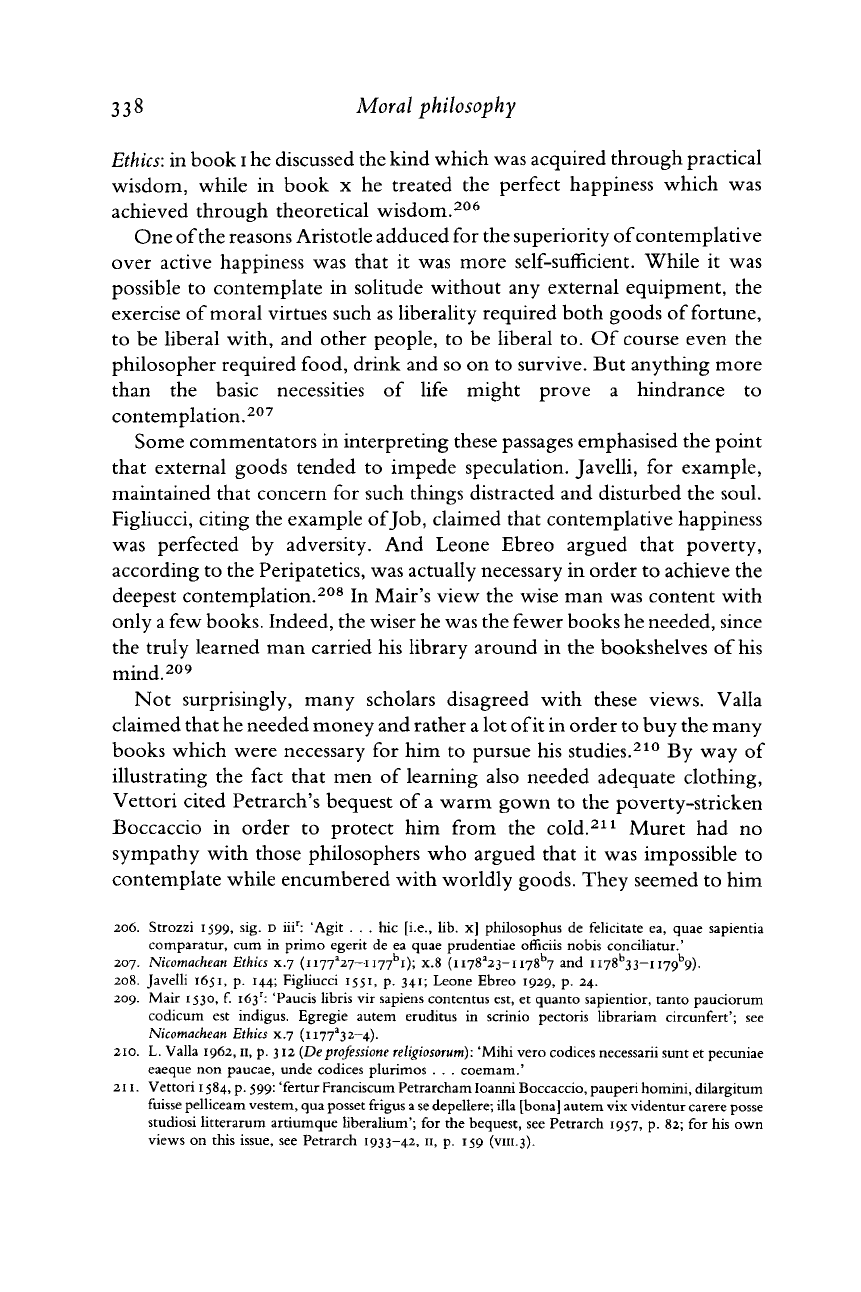
33«
Moral philosophy
Ethics:
in
book
I
he
discussed
the
kind which was acquired through practical
wisdom,
while
in
book
x he
treated
the
perfect happiness which
was
achieved
through theoretical wisdom.
206
One
of
the reasons Aristotle adduced
for the
superiority
of
contemplative
over
active happiness
was that it was
more self-sufficient. While
it was
possible
to
contemplate
in
solitude without
any
external equipment,
the
exercise
of
moral virtues such
as
liberality required both goods
of
fortune,
to
be
liberal with,
and
other people,
to be
liberal
to. Of
course even
the
philosopher required food, drink
and so on to
survive.
But
anything more
than
the
basic necessities
of
life
might prove
a
hindrance
to
contemplation.
207
Some
commentators
in
interpreting these passages emphasised
the
point
that
external goods tended
to
impede speculation. Javelli,
for
example,
maintained
that
concern
for
such things distracted
and
disturbed
the
soul.
Figliucci,
citing
the
example
of
Job, claimed
that
contemplative happiness
was
perfected
by
adversity.
And
Leone Ebreo argued
that
poverty,
according
to the
Peripatetics, was actually necessary
in
order
to
achieve
the
deepest contemplation.
208
In
Mair's
view
the
wise
man was
content with
only
a
few books. Indeed,
the
wiser
he
was
the
fewer books
he
needed, since
the truly learned
man
carried
his
library around
in the
bookshelves
of his
mind.
209
Not
surprisingly, many scholars disagreed with these
views.
Valla
claimed
that he
needed money
and
rather
a lot
of
it
in
order
to buy the
many
books
which were necessary
for him to
pursue
his
studies.
210
By way of
illustrating
the
fact
that men of
learning also needed adequate clothing,
Vettori
cited Petrarch's bequest
of a
warm gown
to the
poverty-stricken
Boccaccio
in
order
to
protect
him
from
the
cold.
211
Muret
had no
sympathy with those philosophers
who
argued
that it was
impossible
to
contemplate while encumbered with worldly goods. They seemed
to him
206. Strozzi 1599, sig. D iii
r
:
'Agit
... hie
[i.e.,
lib. x] philosophus de felicitate ea, quae sapientia
comparatur,
cum in primo egerit de ea quae prudentiae officiis nobis conciliatur.'
207.
Nicomachean Ethics
x.7
(1177*27—n77
b
i);
x.8 (1178*23-H78
b
7 and H78
b
33-ii79
b
9).
208. Javelli 1651, p. 144; Figliucci 1551, p. 341; Leone Ebreo 1929, p. 24.
209.
Mair
1530, f. i63
r
: 'Paucis libris vir sapiens contentus est, et quanto sapientior, tanto pauciorum
codicum est indigus. Egregie autem eruditus in scrinio pectoris librariam circunfert'; see
Nicomachean Ethics
x.7
(1177*32—4).
210.
L. Valla
1962,11,
p. 312
(Deprofessione religiosorum):
'Mihi vero codices necessarii sunt et pecuniae
eaeque non paucae, unde codices plurimos . . . coemam.'
211.
Vettori 1584, p. 599: 'fertur Franciscum Petrarcham Ioanni Boccaccio, pauperi homini, dilargitum
fuisse
pelliceam vestem, qua posset frigus a se depellere; ilia [bona] autem vix videntur carere
posse
studiosi litterarum artiumque liberalium'; for the bequest, see Petrarch 1957, p. 82; for his own
views on this
issue,
see Petrarch 1933-42, 11, p. 159 (vin.3).
Cambridge Histories Online © Cambridge University Press, 2008
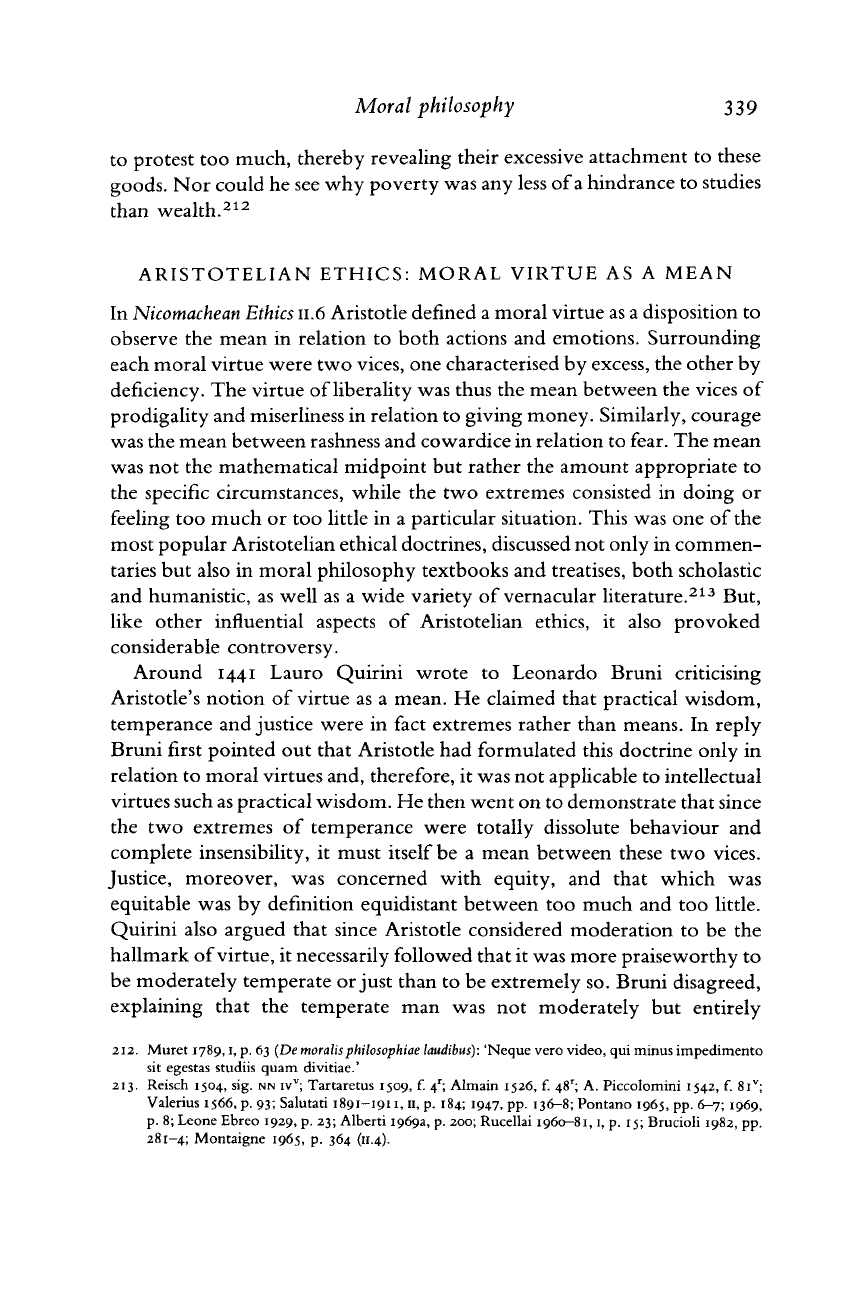
Moral philosophy
339
to protest too much, thereby revealing their excessive attachment to these
goods.
Nor could he see why poverty was any less
of
a hindrance to studies
than
wealth.
212
ARISTOTELIAN
ETHICS:
MORAL
VIRTUE
AS A
MEAN
In Nicomachean Ethics n.6 Aristotle defined a moral virtue as a disposition to
observe
the mean in relation to both actions and emotions. Surrounding
each
moral virtue were two
vices,
one characterised by
excess,
the other by
deficiency.
The virtue
of
liberality
was
thus
the mean between the
vices
of
prodigality
and miserliness in relation to
giving
money. Similarly, courage
was
the mean between rashness and cowardice in relation to fear. The mean
was
not the mathematical midpoint but
rather
the amount appropriate to
the specific circumstances, while the two extremes consisted in doing or
feeling
too much or too little in a particular situation. This was one of the
most popular Aristotelian ethical doctrines, discussed not only in commen-
taries but also in moral philosophy textbooks and treatises, both scholastic
and humanistic, as
well
as a wide variety of vernacular literature.
213
But,
like
other influential aspects of Aristotelian ethics, it also provoked
considerable controversy.
Around
1441 Lauro Quirini wrote to Leonardo Bruni criticising
Aristotle's
notion of virtue as a mean. He claimed
that
practical wisdom,
temperance and justice were in fact extremes
rather
than
means. In reply
Bruni first pointed out
that
Aristotle had formulated this doctrine only in
relation to moral virtues and, therefore, it was not applicable to intellectual
virtues such as practical wisdom. He
then
went on to demonstrate
that
since
the two extremes of temperance were totally dissolute behaviour and
complete insensibility, it must itself be a mean between these two
vices.
Justice, moreover, was concerned with equity, and
that
which was
equitable was by definition equidistant between too much and too little.
Quirini also argued
that
since Aristotle considered moderation to be the
hallmark
of
virtue, it necessarily
followed
that
it was more praiseworthy to
be moderately temperate or just
than
to be extremely so. Bruni disagreed,
explaining
that
the temperate man was not moderately but entirely
212.
Muret
1789,1, p. 63 (De moralisphilosophiae laudibus):
'Ñeque
vero
video,
qui
minus
impedimento
sit
egestas
studiis
quam
divitiae.'
213.
Reisch
1504, sig. NN iv
v
;
Tartaretus
1509, f. 4
r
;
Almain
1526, f. 48
r
; A.
Piccolomini
1542, f. 8i
v
;
Valerius
1566, p. 93;
Salutati
1891-1911,11, p. 184; 1947, pp.
136-8;
Pontano
1965, pp. 6-^7; 1969,
p. 8;
Leone
Ebreo
1929, p. 23;
Albert!
1969a,
p. 200;
Rucellai
1960-81,1,
p. 15;
Brucioli
1982, pp.
281-4;
Montaigne
1965, p. 364 (11.4).
Cambridge Histories Online © Cambridge University Press, 2008
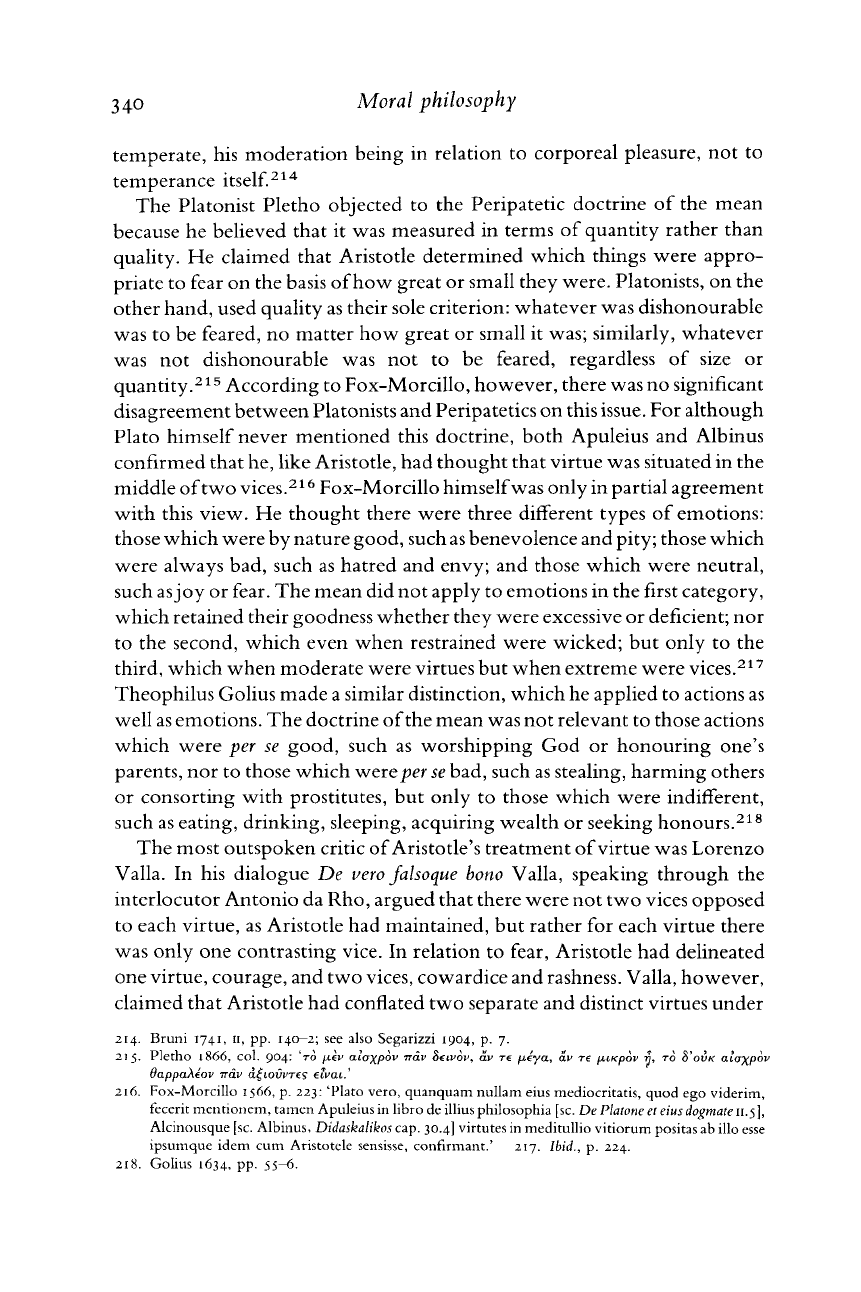
340
Moral philosophy
temperate, his moderation being in relation to corporeal pleasure, not to
temperance itself.
214
The
Platonist Pletho objected to the Peripatetic doctrine of the mean
because he believed
that
it was measured in terms of quantity
rather
than
quality. He claimed
that
Aristotle determined which things were appro-
priate to fear on the basis
of
how
great or small they were. Platonists, on the
other hand, used quality as their sole criterion: whatever was dishonourable
was
to be feared, no matter how great or small it was; similarly, whatever
was
not dishonourable was not to be feared, regardless of size or
quantity.
215
According to
Fox-Morcillo,
however,
there
was no significant
disagreement between Platonists and Peripatetics on this issue. For although
Plato himself never mentioned this doctrine, both Apuleius and Albinus
confirmed
that
he, like Aristotle, had thought
that
virtue was situated in the
middle
of
two
vices.
216
Fox-Morcillo
himself
was
only in partial agreement
with
this
view.
He thought
there
were
three
different types of emotions:
those which were by
nature
good, such as benevolence and pity; those which
were always bad, such as hatred and envy; and those which were neutral,
such asjoy or fear. The mean did not apply to emotions in the first category,
which
retained their goodness whether they were excessive or deficient; nor
to the second, which even when restrained were wicked; but only to the
third,
which when moderate were virtues but when extreme were
vices.
217
Theophilus Golius made a similar distinction, which he applied to actions as
well
as emotions. The doctrine
of
the mean was not relevant to those actions
which
were per se good, such as worshipping God or honouring one's
parents, nor to those which were per se bad, such as stealing, harming others
or consorting with prostitutes, but only to those which were indifferent,
such as eating, drinking, sleeping, acquiring wealth or seeking honours.
218
The
most outspoken critic
of
Aristotle's
treatment
of
virtue was Lorenzo
Valla.
In his dialogue De vero falsoque bono
Valla,
speaking through the
interlocutor Antonio da Rho, argued
that
there
were not two vices opposed
to each virtue, as Aristotle had maintained, but
rather
for each virtue
there
was
only one contrasting
vice.
In relation to fear, Aristotle had delineated
one virtue, courage, and two
vices,
cowardice and rashness.
Valla,
however,
claimed
that
Aristotle had conflated two separate and distinct virtues under
214.
Bruni
1741, 11, pp.
140-2;
see
also
Segarizzi
1904, p. 7.
215.
Pletho
1866, col. 904: 'to (xkv aloxpov
Tráv
Seivov, av re /xeya, av re puxpov rj, TO
8'OVK
aiaxpov
dappaXeov
rrdv
a^iovvres
efvai.'
216.
Fox-Morcillo
1566, p. 223:
'Plato
vero,
quanquam
nullam
eius
mediocritatis,
quod
ego
viderim,
fecerit
mentionem,
tamen
Apuleius
in
libro
de
illius
philosophia
[sc. De Platone et eiusdogmate 11.5],
Alcinousque
[sc.
Albinus,
Didaskalikos cap. 30.4]
virtutes
in
meditullio
vitiorum
positas
ab
illo
esse
ipsumque
idem
cum
Aristotele
sensisse,
confirmant.'
217. Ibid., p. 224.
218.
Golius
1634, pp. 55-6.
Cambridge Histories Online © Cambridge University Press, 2008
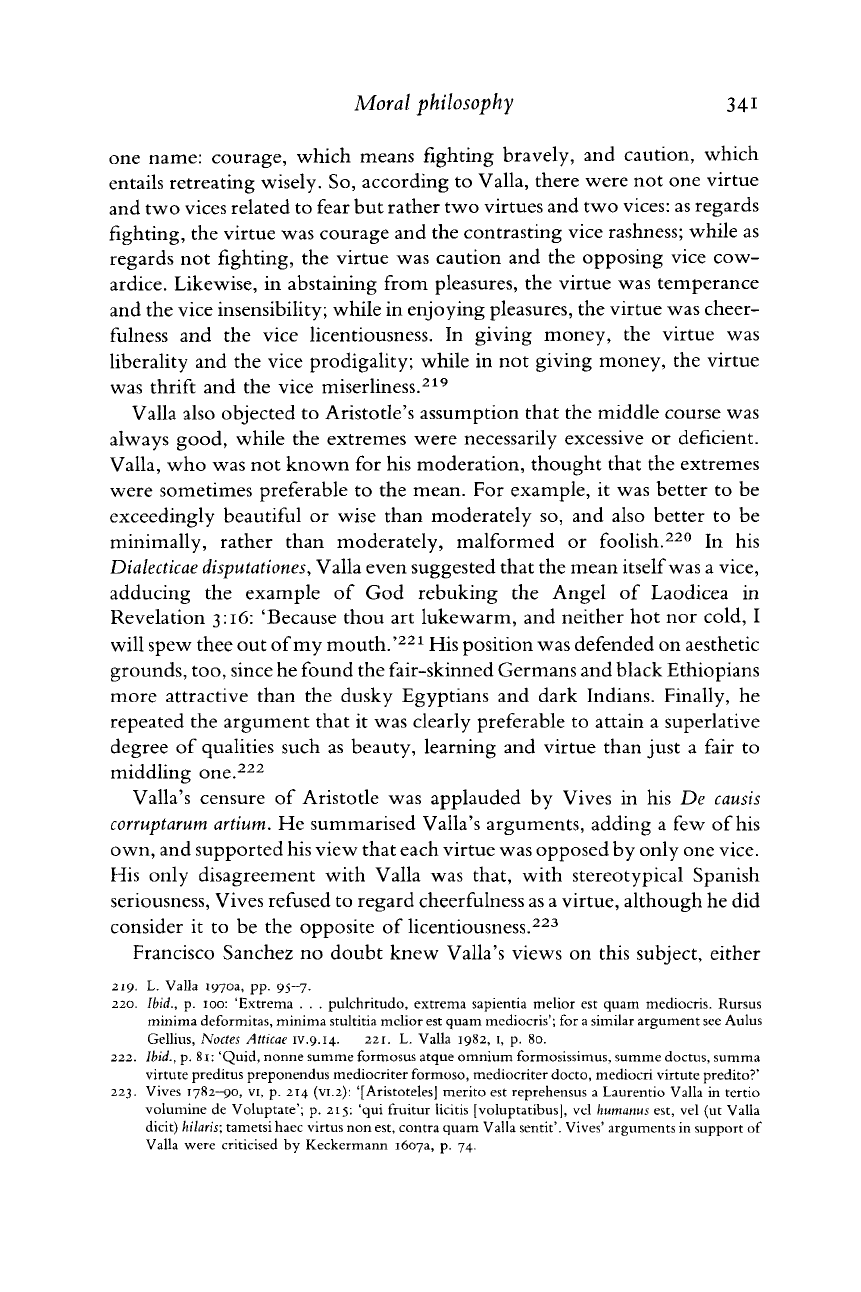
Moral philosophy
34i
one name: courage, which means fighting bravely, and caution, which
entails retreating wisely. So, according to
Valla,
there
were not one virtue
and two vices related to fear but
rather
two virtues and two
vices:
as regards
fighting,
the virtue was courage and the contrasting vice rashness; while as
regards not fighting, the virtue was caution and the opposing vice cow-
ardice. Likewise, in abstaining from pleasures, the virtue was temperance
and the vice insensibility; while in enjoying pleasures, the virtue was cheer-
fulness and the vice licentiousness. In giving money, the virtue was
liberality and the vice prodigality; while in not giving money, the virtue
was
thrift and the vice miserliness.
219
Valla
also objected to Aristotle's assumption
that
the middle course was
always
good, while the extremes were necessarily excessive or deficient.
Valla,
who was not known for his moderation, thought
that
the extremes
were sometimes preferable to the mean. For example, it was better to be
exceedingly
beautiful or wise
than
moderately so, and also better to be
minimally,
rather
than
moderately, malformed or foolish.
220
In his
Dialecticae
disputationes,
Valla
even suggested
that
the mean
itself
was
a
vice,
adducing the example of God rebuking the
Angel
of Laodicea in
Revelation
3:16: 'Because thou art lukewarm, and neither hot nor cold, I
will
spew thee out
of
my
mouth.'
221
His position was defended on aesthetic
grounds, too, since he found the fair-skinned Germans and black Ethiopians
more attractive
than
the dusky Egyptians and dark Indians. Finally, he
repeated the argument
that
it was clearly preferable to attain a superlative
degree of qualities such as beauty, learning and virtue
than
just a fair to
middling one.
222
Valla's
censure of Aristotle was applauded by
Vives
in his De causis
corruptarum
artium.
He summarised Valla's arguments, adding a few of his
own,
and supported his view
that
each virtue was opposed by only one
vice.
His only disagreement with
Valla
was
that,
with stereotypical Spanish
seriousness,
Vives
refused to regard cheerfulness as a virtue, although he did
consider it to be the opposite of licentiousness.
223
Francisco Sanchez no doubt knew Valla's views on this subject, either
219. L.
Valla
1970a,
pp. 95-7.
220. Ibid., p. 100:
'Extrema
. . .
pulchritudo,
extrema
sapientia
melior
est
quam
mediocris.
Rursus
minima
deformitas,
minima
stultitia
melior
est
quam
mediocris';
for a
similar
argument
see
Aulus
Gellius,
Nodes Atticae
iv.9.14.
221. L.
Valla
1982, 1, p. 80.
222. Ibid., p. 81:
'Quid,
nonne
summe
formosus
atque
omnium
formosissimus,
summe
doctus,
summa
virtute
preditus
preponendus
mediocriter
formoso,
mediocriter
docto,
mediocri
virtute
predito?'
223.
Vives
1782-90,
vi, p. 214
(vi.2):
'[Aristoteles]
merito
est
reprehensus
a
Laurentio
Valla
in
tertio
volumine
de
Voluptate';
p. 215: 'qui
fruitur
licitis
[voluptatibus],
vel
humanus
est, vel (ut
Valla
dicit)
hilaris;
tametsi
haec
virtus
non est,
contra
quam
Valla
sen tit'.
Vives'
arguments
in
support
of
Valla
were
criticised
by
Keckermann
1607a,
p. 74.
Cambridge Histories Online © Cambridge University Press, 2008
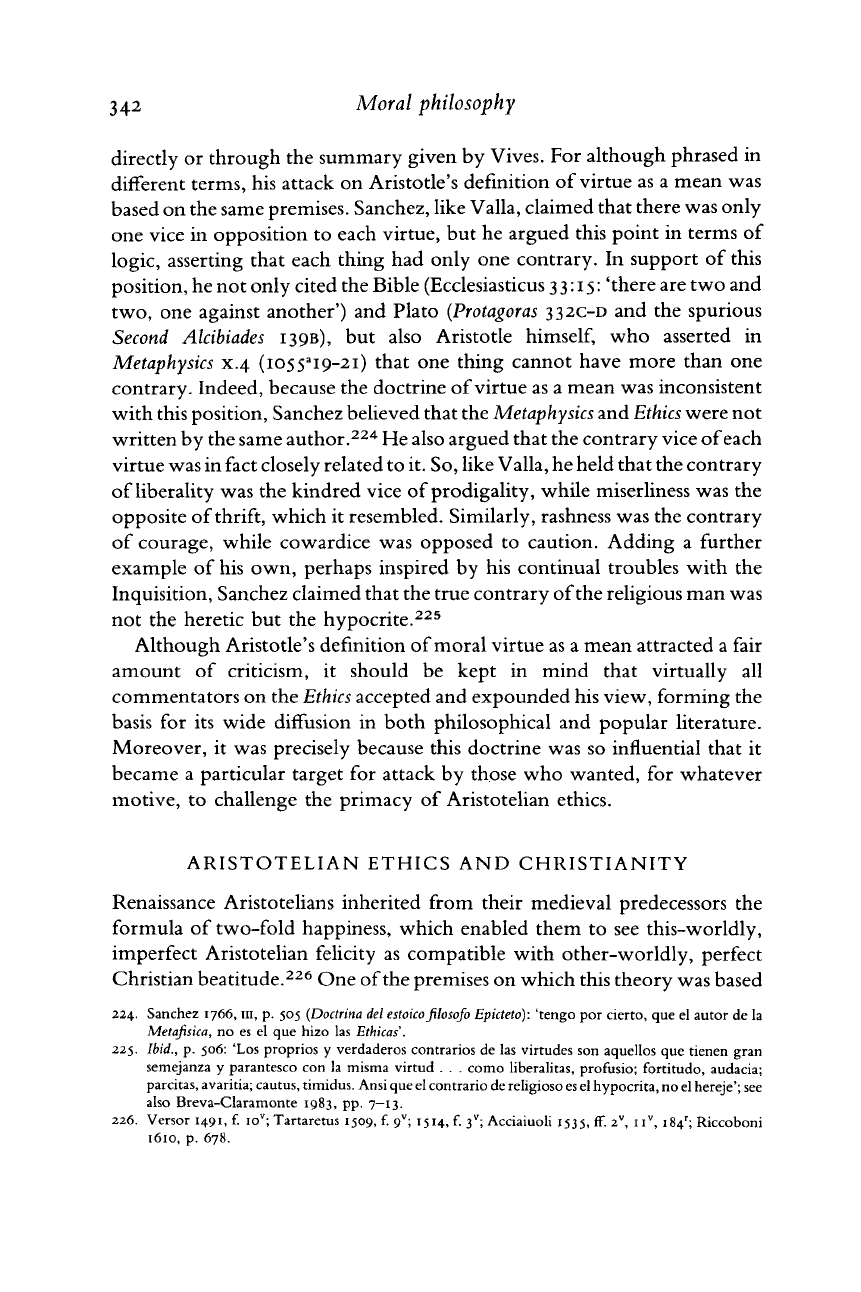
342
Moral philosophy
directly or through the summary
given
by
Vives.
For although phrased in
different terms, his attack on Aristotle's definition of virtue as a mean was
based on the same premises. Sanchez, like
Valla,
claimed
that
there
was only
one
vice
in opposition to each virtue, but he argued this point in terms of
logic,
asserting
that
each thing had only one contrary. In support of this
position, he not only cited the
Bible
(Ecclesiasticus
33:15:
'there
are two and
two,
one against another') and Plato (Protagoras
332C-D
and the spurious
Second
Alcibiades
139B),
but also Aristotle himself, who asserted in
Metaphysics x.4 (i055
a
i9-2i)
that
one thing cannot have more
than
one
contrary. Indeed, because the doctrine
of
virtue as a mean was inconsistent
with
this position, Sanchez believed
that
the Metaphysics and Ethics were not
written by the same author.
224
He also argued
that
the contrary
vice
of
each
virtue was in fact
closely
related to it. So, like
Valla,
he held
that
the contrary
of
liberality was the kindred
vice
of prodigality, while miserliness was the
opposite
of
thrift, which it resembled. Similarly, rashness was the contrary
of
courage, while cowardice was opposed to caution. Adding a further
example of his own, perhaps inspired by his continual troubles with the
Inquisition, Sanchez claimed
that
the
true
contrary
of
the religious man was
not the heretic but the hypocrite.
225
Although
Aristotle's definition of moral virtue as a mean attracted a fair
amount of criticism, it should be kept in mind
that
virtually all
commentators on the Ethics accepted and expounded his
view,
forming the
basis for its wide diffusion in both philosophical and popular literature.
Moreover,
it was precisely because this doctrine was so influential
that
it
became a particular target for attack by those who wanted, for whatever
motive,
to challenge the primacy of Aristotelian ethics.
ARISTOTELIAN
ETHICS
AND
CHRISTIANITY
Renaissance Aristotelians inherited from their medieval predecessors the
formula of two-fold happiness, which enabled them to see this-worldly,
imperfect Aristotelian
felicity
as compatible with other-worldly, perfect
Christian beatitude.
226
One
of
the premises on which this theory was based
224.
Sanchez
1766, m, p. 505 (Doctrina del estoico filosofo Epicteto):
'tengo
por
cierto,
que el
autor
de la
Metafísica, no es el que
hizo
las Ethicas\
225. Ibid., p. 506: 'Los
proprios
y
verdaderos
contrarios
de las
virtudes
son
aquellos
que
tienen
gran
semejanza
y
parantesco
con la
misma
virtud
. . .
como
liberalitas,
profusio;
fortitudo,
audacia;
parcitas,
avaritia;
cautus,
timidus.
Ansi
que el
contrario
de
religioso
es el
hypocrita,
no el
hereje';
see
also
Breva-Claramonte
1983, pp. 7-13.
226.
Versor
1491, f. io
v
;
Tartaretus
1509, f. 9
V
; 1514, f. 3
V
;
Acciaiuoli
1535, fF. 2
V
, 1 i
v
,
i84
r
;
Riccoboni
1610, p. 678.
Cambridge Histories Online © Cambridge University Press, 2008
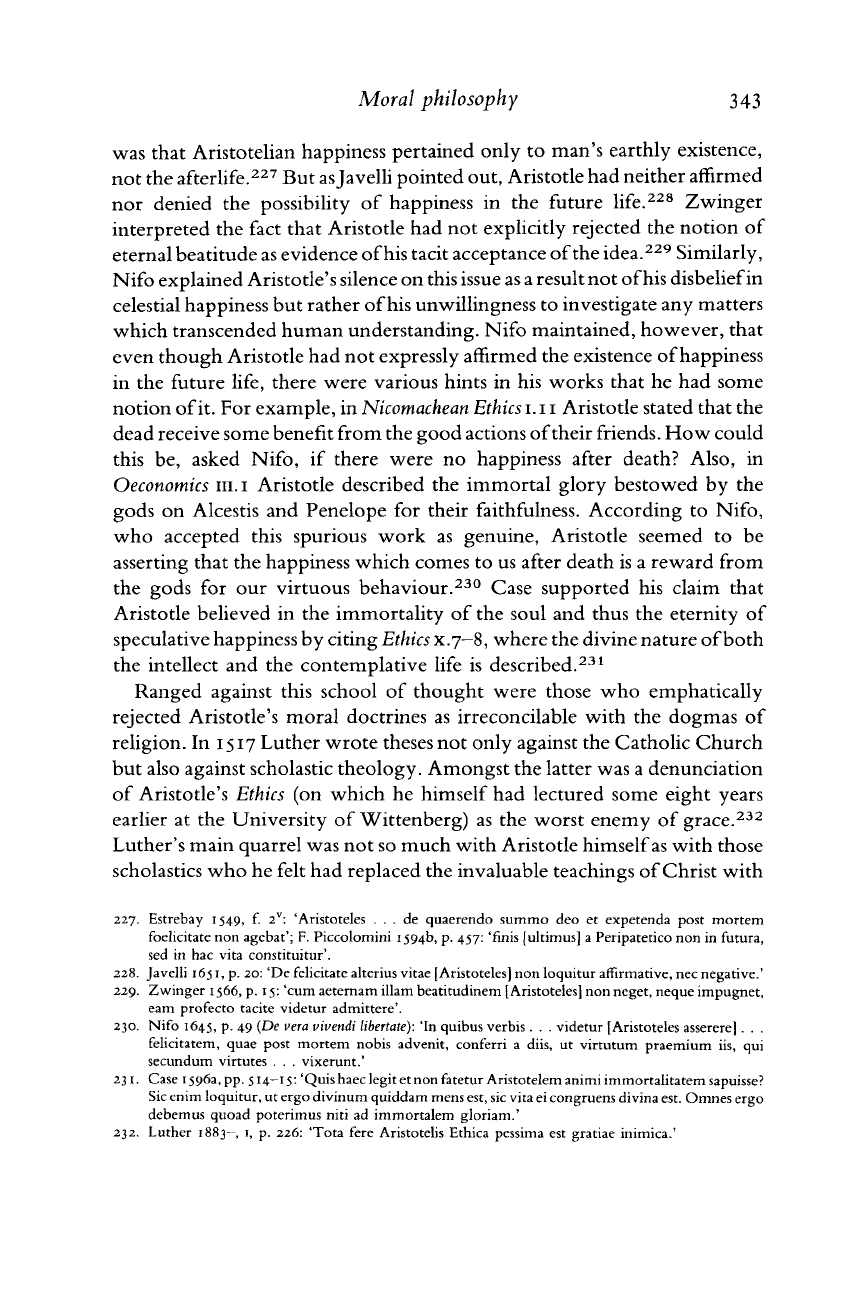
Moral philosophy
343
was
that
Aristotelian happiness pertained only
to
man's earthly existence,
not
the
afterlife.
227
But
asjavelli pointed
out,
Aristotle
had
neither affirmed
nor denied
the
possibility
of
happiness
in the
future
life.
228
Zwinger
interpreted
the
fact
that
Aristotle
had not
explicitly rejected
the
notion
of
eternal beatitude
as
evidence
of
his tacit acceptance
of
the idea.
229
Similarly,
Nifo
explained Aristotle's silence
on
this issue as
a
result
not
of
his
disbelief
in
celestial
happiness
but
rather
of
his unwillingness
to
investigate
any
matters
which
transcended human understanding. Nifo maintained, however,
that
even
though Aristotle
had not
expressly affirmed
the
existence
of
happiness
in
the
future
life,
there
were various hints
in his
works
that he had
some
notion
of
it.
For
example,
in
Nicomachean Ethics
1.11
Aristotle stated
that the
dead receive some benefit from
the
good actions
of
their friends.
How
could
this
be,
asked
Nifo,
if
there
were
no
happiness after death?
Also,
in
Oeconomics
III.I
Aristotle described
the
immortal glory bestowed
by the
gods
on
Alcestis
and
Penelope
for
their faithfulness. According
to
Nifo,
who
accepted this spurious work
as
genuine, Aristotle seemed
to be
asserting
that the
happiness which comes
to us
after death
is a
reward from
the gods
for our
virtuous behaviour.
230
Case supported
his
claim
that
Aristotle
believed
in the
immortality
of the
soul
and
thus
the
eternity
of
speculative happiness
by
citing Ethics
x.7—8,
where
the
divine
nature
of
both
the intellect
and the
contemplative
life
is
described.
231
Ranged against this school
of
thought were those
who
emphatically
rejected Aristotle's moral doctrines
as
irreconcilable with
the
dogmas
of
religion.
In
1517
Luther wrote theses
not
only against
the
Catholic Church
but also against scholastic theology. Amongst
the
latter was
a
denunciation
of
Aristotle's Ethics
(on
which
he
himself
had
lectured some eight years
earlier
at the
University
of
Wittenberg)
as the
worst enemy
of
grace.
232
Luther's main quarrel was
not so
much with Aristotle
himself
as with those
scholastics
who he
felt
had
replaced
the
invaluable teachings
of
Christ with
227.
Estrebay 1549, f. 2
V
: 'Aristoteles . . . de quaerendo summo deo et expetenda post mortem
foelicitate non agebat'; F. Piccolomini 1594b, p. 457:
'finis [ultimus]
a Peripatetico non in futura,
sed in hac vita constituitur'.
228. Javelli 1651, p. 20: 'De felicitate alterius vitae [Aristoteles] non loquitur affirmative, nec negative.'
229. Zwinger 1566, p. 15: 'cum aeternam illam beatitudinem [Aristoteles] non neget, neque impugnet,
earn profecto tacite videtur admittere'.
230. Nifo 1645, p. 49 (De
vera vivendi libertate):
'In quibus verbis. . . videtur [Aristoteles
asserere]
. . .
felicitatem, quae post mortem nobis advenit, conferri a diis, ut virtutum praemium iis, qui
secundum virtutes . . . vixerunt.'
231.
Case 1596a, pp.
514-15:
'Quis haec legit et non fatetur Aristotelem animi immortalitatem sapuisse?
Sic enim loquitur, ut ergo divinum quiddam
mens
est, sic vita ei congruens divina est. Omnes ergo
debemus quoad poterimus niti ad immortalem gloriam.'
232. Luther 1883-, 1, p. 226:
Tota
fere Aristotelis Ethica pessima est gratiae inimica.'
Cambridge Histories Online © Cambridge University Press, 2008
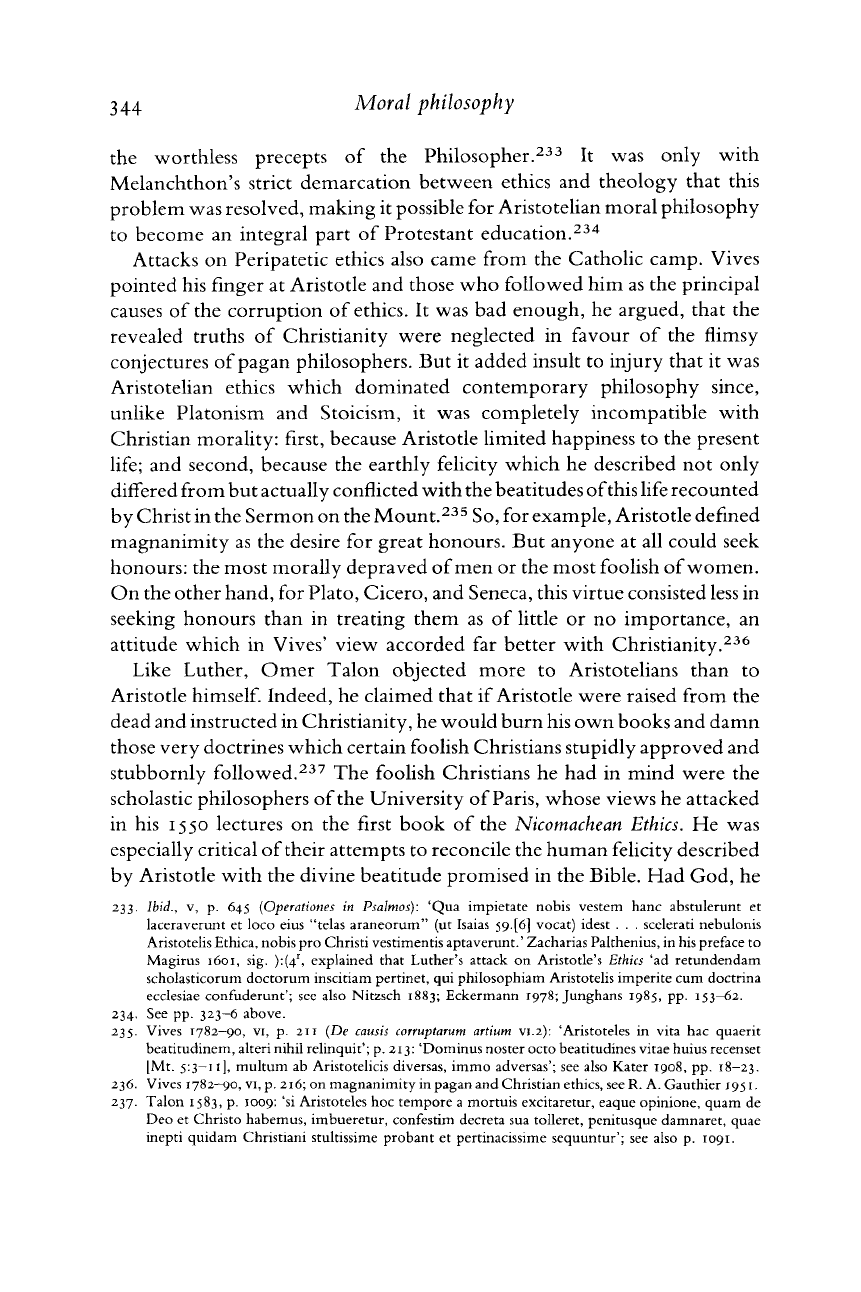
344 Moral philosophy
the worthless precepts
of the
Philosopher.
233
It was
only with
Melanchthon's strict demarcation between ethics
and
theology
that
this
problem was resolved, making
it
possible
for
Aristotelian moral philosophy
to become
an
integral
part
of
Protestant education.
234
Attacks
on
Peripatetic ethics also came from
the
Catholic camp.
Vives
pointed
his
finger
at
Aristotle
and
those
who
followed
him as the
principal
causes
of the
corruption
of
ethics.
It was bad
enough,
he
argued,
that the
revealed
truths of
Christianity were neglected
in
favour
of the
flimsy
conjectures
of
pagan philosophers.
But it
added insult
to
injury
that it was
Aristotelian
ethics which dominated contemporary philosophy since,
unlike Platonism
and
Stoicism,
it was
completely incompatible with
Christian morality: first, because Aristotle limited happiness
to the
present
life;
and
second, because
the
earthly
felicity
which
he
described
not
only
differed
from
but
actually conflicted with
the
beatitudes
of
this
life
recounted
by
Christ
in the
Sermon
on the
Mount.
235
So,
for
example, Aristotle defined
magnanimity
as the
desire
for
great honours.
But
anyone
at all
could seek
honours:
the
most morally depraved
of
men
or the
most foolish
of
women.
On
the
other
hand,
for
Plato,
Cicero,
and
Seneca, this virtue consisted less
in
seeking
honours
than
in
treating them
as of
little
or no
importance,
an
attitude
which
in
Vives'
view
accorded
far
better
with Christianity.
236
Like
Luther, Omer Talon objected more
to
Aristotelians
than
to
Aristotle
himself. Indeed,
he
claimed
that if
Aristotle were raised from
the
dead
and
instructed
in
Christianity,
he
would
burn
his own books
and
damn
those very doctrines which certain foolish Christians stupidly approved
and
stubbornly
followed.
237
The
foolish Christians
he had in
mind were
the
scholastic philosophers
of
the University
of
Paris, whose
views
he
attacked
in
his 1550
lectures
on the
first book
of the
Nicomachean Ethics.
He was
especially
critical
of
their
attempts
to
reconcile
the
human
felicity
described
by
Aristotle with
the
divine beatitude promised
in the
Bible.
Had
God,
he
233.
Ibid.,
v, p. 645
(Operationes
in
Psalmos):
'Qua impietate nobis vestem hanc abstulerunt et
laceraverunt
et loco
eius
"telas araneorum" (ut Isaias
59.[6]
vocat) idest . . . scelerati nebulonis
Aristotelis Ethica, nobis pro Christi vestimentis aptaverunt.' Zacharias Palthenius, in his preface to
Magirus
1601, sig.
):(4
r
,
explained that Luther's attack on Aristotle's
Ethics
'ad retundendam
scholasticorum doctorum inscitiam pertinet, qui philosophiam Aristotelis imperite cum doctrina
ecclesiae confuderunt'; see also Nitzsch 1883; Eckermann 1978; Junghans 1985, pp. 153—62.
234. See pp. 323-6 above.
235.
Vives 1782—90, vi, p. 211 (De
causis
corruptarum
artium vi.2): 'Aristoteles in vita hac quaerit
beatitudinem, alteri nihil relinquit'; p. 213: 'Dominus noster octo beatitudines vitae huius recenset
[Mt. 5:3-11],
multum ab Aristotelicis diversas, immo adversas'; see also Kater 1908, pp. 18-23.
236. Vives 1782—90, vi, p. 216; on magnanimity in pagan and Christian ethics, seeR. A. Gauthier 1951.
237.
Talon 1583, p. 1009: 'si Aristoteles hoc tempore a mortuis excitaretur, eaque opinione, quam de
Deo et Christo habemus, imbueretur, confestim decreta sua tolleret, penitusque damnaret, quae
inepti quidam Christiani stultissime probant et pertinacissime sequuntur'; see also p. 1091.
Cambridge Histories Online © Cambridge University Press, 2008
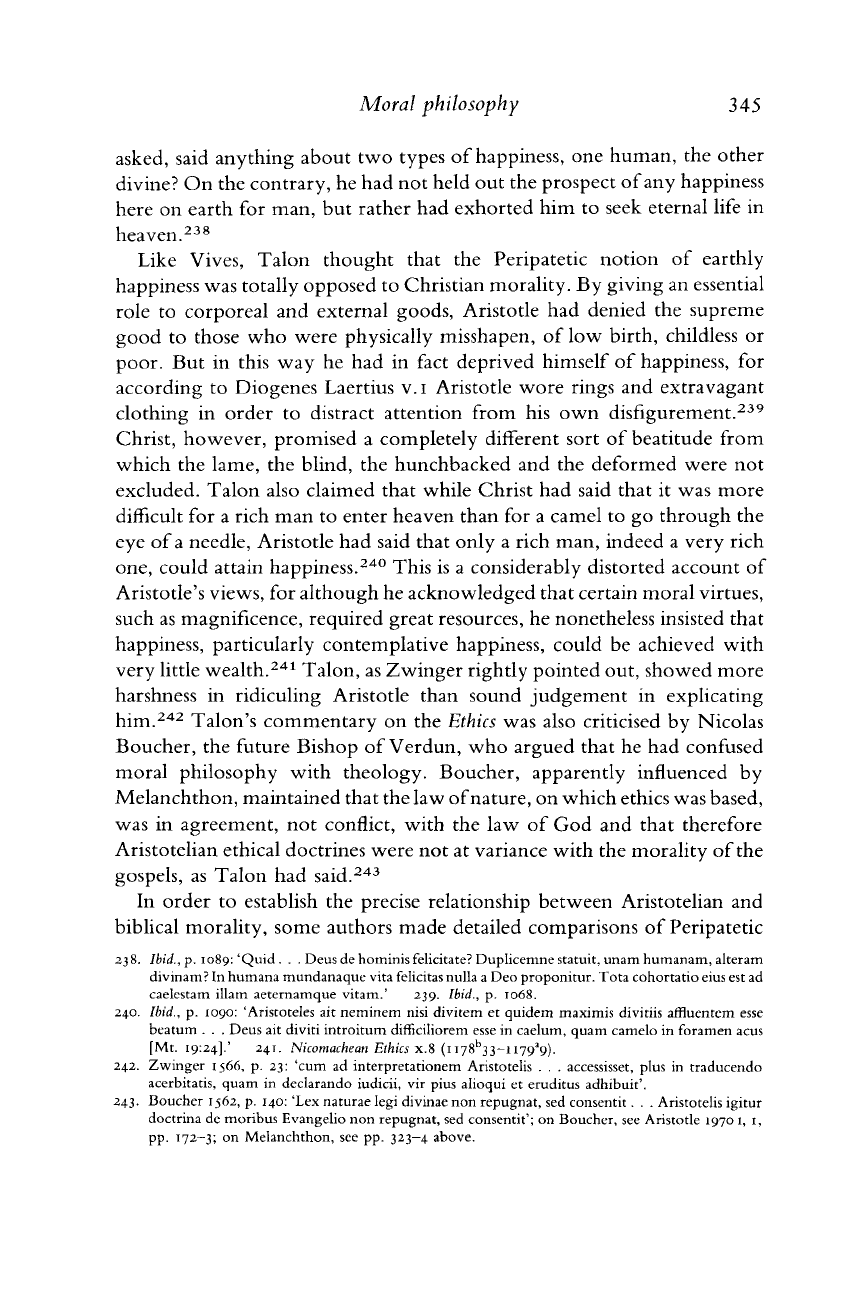
Moral philosophy
345
asked, said anything about
two
types
of
happiness,
one
human,
the
other
divine?
On the
contrary,
he had not
held
out the
prospect
of
any happiness
here
on
earth
for man, but
rather
had
exhorted
him to
seek eternal
life
in
heaven.
238
Like
Vives,
Talon thought
that the
Peripatetic notion
of
earthly
happiness was totally opposed
to
Christian morality.
By
giving
an
essential
role
to
corporeal
and
external goods, Aristotle
had
denied
the
supreme
good
to
those
who
were physically misshapen,
of
low birth, childless
or
poor.
But in
this
way he had in
fact deprived himself
of
happiness,
for
according
to
Diogenes Laertius
v.i
Aristotle wore rings
and
extravagant
clothing
in
order
to
distract attention from
his own
disfigurement.
239
Christ,
however, promised
a
completely different sort
of
beatitude from
which
the
lame,
the
blind,
the
hunchbacked
and the
deformed were
not
excluded.
Talon also claimed
that
while Christ
had
said
that it was
more
difficult
for a
rich
man to
enter heaven
than
for a
camel
to go
through
the
eye
of
a needle, Aristotle
had
said
that
only
a
rich
man,
indeed
a
very rich
one,
could attain happiness.
240
This
is a
considerably distorted account
of
Aristotle's
views,
for
although
he
acknowledged
that
certain moral virtues,
such
as
magnificence, required great resources,
he
nonetheless insisted
that
happiness, particularly contemplative happiness, could
be
achieved with
very
little wealth.
241
Talon,
as
Zwinger rightly pointed
out,
showed more
harshness
in
ridiculing Aristotle
than
sound judgement
in
explicating
him.
242
Talon's commentary
on the
Ethics
was
also criticised
by
Nicolas
Boucher,
the
future Bishop
of
Verdun,
who
argued
that he had
confused
moral philosophy with theology. Boucher, apparently influenced
by
Melanchthon, maintained
that the
law
of
nature,
on
which ethics was based,
was
in
agreement,
not
conflict, with
the law of God and that
therefore
Aristotelian
ethical doctrines were
not at
variance with
the
morality
of the
gospels,
as
Talon
had
said.
243
In order
to
establish
the
precise relationship between Aristotelian
and
biblical
morality, some authors made detailed comparisons
of
Peripatetic
238.
Ibid.,
p. 1089: 'Quid . . . Deus de hominis felicitate? Duplicemne statuit, unam humanam, alteram
divinam?
In humana mundanaque vita felicitas nulla a Deo proponitur.
Tota
cohortatio
eius
est ad
caelestam illam aeternamque vitam.' 239.
Ibid.,
p. 1068.
240.
Ibid.,
p. 1090: 'Aristoteles ait neminem
nisi
divitem et quidem maximis divitiis affluentem
esse
beatum . . . Deus ait diviti introitum difficiliorem
esse
in caelum, quam camelo in foramen acus
[Mt.
19:24].' 241.
Nicomachean Ethics
x.8 (1178
b
33~i 179*9).
242. Zwinger 1566, p. 23: 'cum ad interpretationem Aristotelis . . .
accessisset,
plus in traducendo
acerbitatis,
quam in declarando iudicii, vir pius alioqui et eruditus adhibuit'.
243. Boucher 1562, p. 140: 'Lex naturae legi divinae non repugnat, sed consentit. . . Aristotelis igitur
doctrina de moribus Evangelio non repugnat, sed consentit'; on Boucher, see Aristotle 1970 1, 1,
pp. 172—3;
on Melanchthon, see pp.
323—4
above.
Cambridge Histories Online © Cambridge University Press, 2008
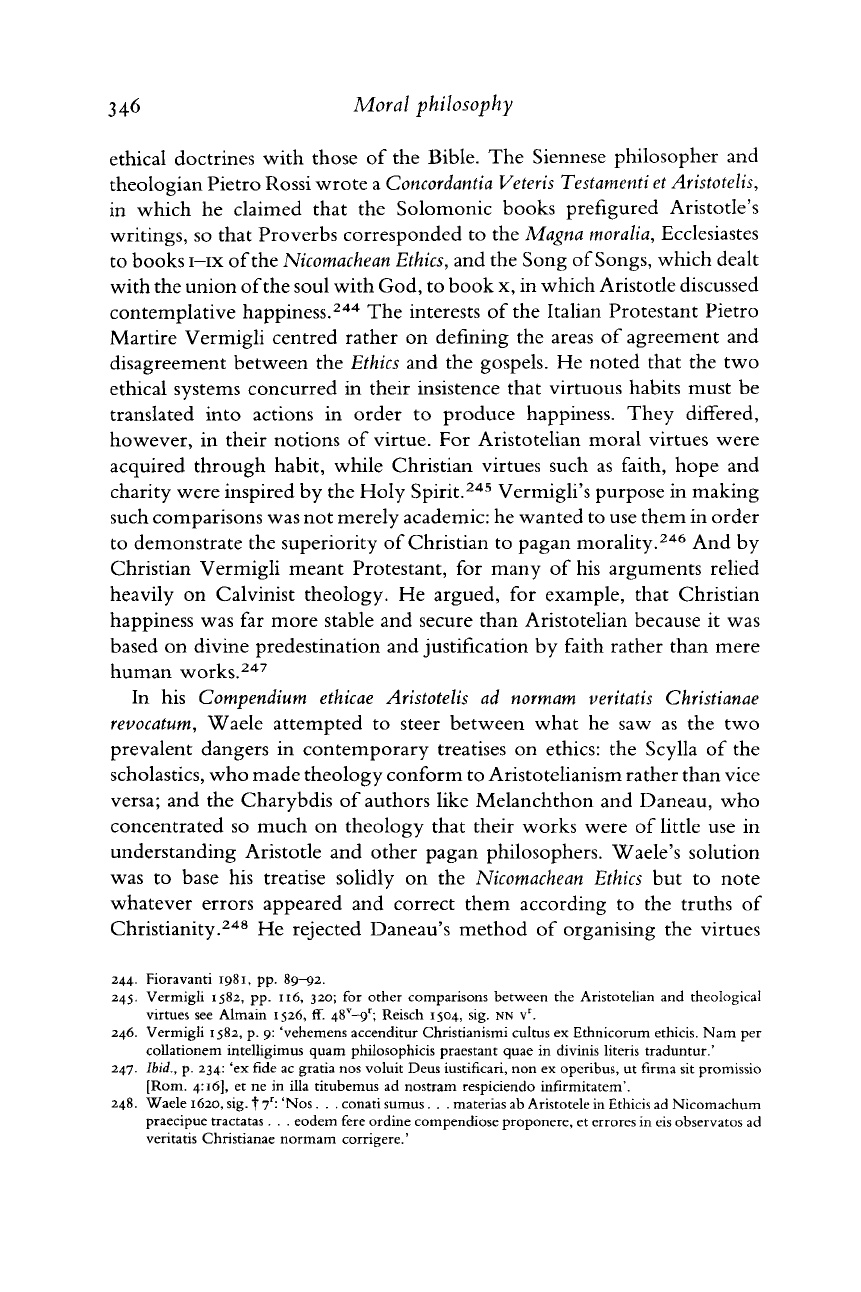
346
Moral philosophy
ethical doctrines with those
of the
Bible.
The
Siennese philosopher
and
theologian
Pietro Rossi wrote
a
Concordantia Veteris Testamenti
et
Aristotelis,
in which
he
claimed
that
the
Solomonic books prefigured Aristotle's
writings,
so
that
Proverbs corresponded
to the
Magna moralia, Ecclesiastes
to books i—ix
of
the Nicomachean Ethics,
and the
Song
of
Songs,
which dealt
with
the
union
of
the soul with God,
to
book
x, in
which Aristotle discussed
contemplative happiness.
244
The
interests
of the
Italian Protestant Pietro
Martire
Vermigli
centred
rather
on
defining
the
areas
of
agreement
and
disagreement between
the
Ethics
and the
gospels.
He
noted
that
the two
ethical systems concurred
in
their insistence
that
virtuous habits must
be
translated into actions
in
order
to
produce happiness. They differed,
however,
in
their notions
of
virtue.
For
Aristotelian moral virtues were
acquired through habit, while Christian virtues such
as
faith, hope
and
charity were inspired
by the
Holy Spirit.
245
Vermigli's purpose
in
making
such comparisons was
not
merely academic:
he
wanted
to use
them
in
order
to demonstrate
the
superiority
of
Christian
to
pagan morality.
246
And by
Christian
Vermigli
meant Protestant,
for
many
of his
arguments relied
heavily
on
Calvinist theology.
He
argued,
for
example,
that
Christian
happiness
was far
more stable
and
secure
than
Aristotelian because
it was
based
on
divine predestination
and
justification
by
faith
rather
than
mere
human works.
247
In
his
Compendium ethicae Aristotelis
ad normam
veritatis Christianae
revocatum, Waele attempted
to
steer between what
he saw as the two
prevalent dangers
in
contemporary treatises
on
ethics:
the
Scylla
of the
scholastics,
who
made theology conform
to
Aristotelianism
rather
than
vice
versa;
and the
Charybdis
of
authors like Melanchthon
and
Daneau,
who
concentrated
so
much
on
theology
that
their works were
of
little
use in
understanding Aristotle
and
other pagan philosophers. Waele's solution
was
to
base
his
treatise solidly
on the
Nicomachean Ethics
but to
note
whatever
errors appeared
and
correct them according
to the truths of
Christianity.
248
He
rejected Daneau's method
of
organising
the
virtues
244. Fioravanti 1981, pp.
89—92.
245. Vermigli 1582, pp. 116, 320; for other comparisons between the Aristotelian and theological
virtues see Almain 1526, fF.
48
v
-9
r
;
Reisch 1504, sig. NN v
r
.
246. Vermigli 1582, p. 9: 'vehemens accenditur Christianismi cultus ex Ethnicorum ethicis. Nam per
collationem intelligimus quam philosophicis praestant quae in divinis Uteris traduntur.'
247.
Ibid.,
p. 234: 'ex fide ac gratia nos voluit Deus iustificari, non ex operibus, ut firma sit promissio
[Rom. 4:16], et ne in ilia titubemus ad nostram respiciendo infirmitatem'.
248. Waele 1620, sig. f 7
r
:'Nos. . . conati sumus. . . materias ab Aristotele in Ethicis ad Nicomachum
praecipue tractatas . . . eodem fere ordine compendiose proponere, et errores in eis observatos ad
veritatis Christianae normam corrigere.'
Cambridge Histories Online © Cambridge University Press, 2008
